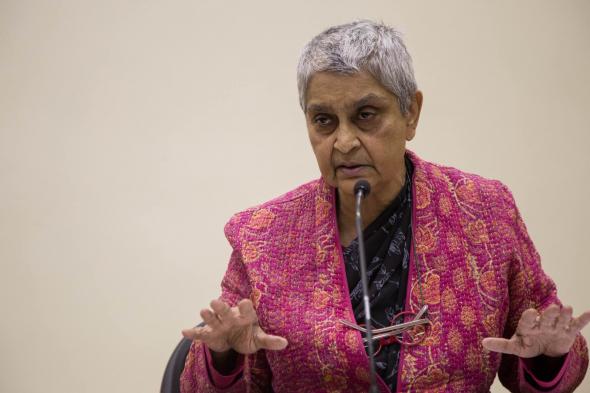Study, Know, Learn, Hear, Listen, Do? Humanities for Social Studies
In globality, old socio-cultural habits have returned. The colonial experience was short-lived. The beginnings of postcoloniality was a slow loss of the results of that experience. Postcoloniality is now defined in terms of location and diaspora. Some areas of the world are in extremis to which none of the programs hosted by you can apply. How do we think solutions? Where is the gendered rural episteme? The humanities emphasize the cognitive variations reflected in my title. How can these variations enhance work in qualitative social sciences as a means to an imaginative activism that allows for the spatial distinctions implied in the current conjuncture, as indicated above, as well as the epistemological performance required by those of us who investigate for institutional validation?
 Gayatri Chakravorty Spivak
Gayatri Chakravorty Spivak
Gayatri Chakravorty Spivak is University Professor, and a founding member of the Institute for Comparative Literature and Society. B.A. English (First Class Honors), Presidency College, Calcutta, 1959. Ph.D. Comparative Literature, Cornell University, 1967. D. Litt, University of Toronto, 1999; D. Litt, University of London, 2003; D. Hum, Oberlin College, 2008; D. Honoris Causa, Universitat Roveri I Virgili, 2011; D. Honoris Causa, Rabindra Bharati, 2012; Kyoto Prize in Thought and Ethics, 2012; Padma Bhushan 2013; D.Honoris Causa, Universidad Nacional de San Martin, 2013; D. Litt, University of St. Andrews, 2014; D. Honoris Causa, Paris VIII, 2014; Presidency University, 2014; D. Hum, Yale University, 2015; D. Litt, University of Ghana-Legon, 2015; D. Honoris Causa, Universidad de Chile, 2016; Lifetime Scholarly Achievement from the Modern Language Association of America, 2018.
Fields: 19th- and 20th-century literature; politics of culture; feminism; Marx, Derrida; globalization. Books: Myself Must I Remake: The Life and Poetry of W. B. Yeats (1974), Of Grammatology (translation with critical introduction of Jacques Derrida, De la grammatologie, 1976), In Other Worlds: Essays in Cultural Politics (1987; Routledge Classic 2002), Selected Subaltern Studies (ed., 1988), The Post-Colonial Critic: Interviews, Strategies, Dialogues (1990), Thinking Academic Freedom in Gendered Post-Coloniality (1993; 2d ed forthcoming), Outside in the Teaching Machine (1993; Routledge classic 2003), Imaginary Maps (translation with critical introduction of three stories by Mahasweta Devi, 1994), The Spivak Reader (1995), Breast Stories (translation with critical introduction of three stories by Mahasweta Devi, 1997), Old Women (translation with critical introduction of two stories by Mahasweta Devi, 1999), Imperatives to Re-Imagine the Planet / Imperative zur Neuerfindung des Planeten (ed. Willi Goetschel, 1999; 2d ed. forthcoming), A Critique of Postcolonial Reason: Towards a History of the Vanishing Present (1999), Song for Kali: A Cycle (translation with introduction of Ramproshad Sen, 2000), Chotti Munda and His Arrow (translation with critical introduction of a novel by Mahasweta Devi, 2002), Death of a Discipline (2003), Other Asias (2005), An Aesthetic Education in the Age of Globalization (2012), Readings (2014), Du Bois and the General Strike (forthcoming). Significant articles: “Subaltern Studies: Deconstructing Historiography” (1985), “Three Women’s Texts and a Critique of Imperialism” (1985), “Can the Subaltern Speak?” (1988), “The Politics of Translation” (1992), “Moving Devi” (1999), “Righting Wrongs” (2003), “Ethics and Politics in Tagore, Coetzee, and Certain Scenes of Teaching” (2004), “Translating into English” (2005), “Rethinking Comparativism” (2010), “A Borderless World” (2011), “General Strike” (2012), “Crimes of Identity” (2014), “Our World” (2014). Activist in rural education and feminist and ecological social movements since 1986.


